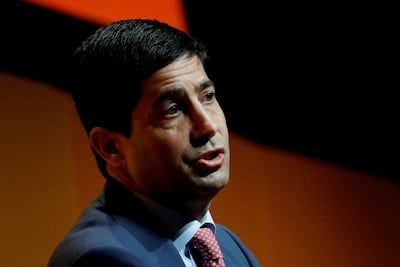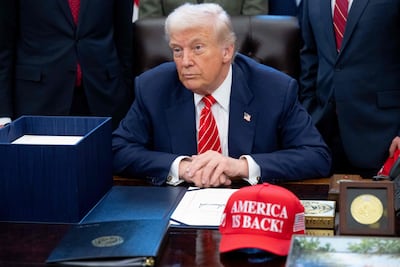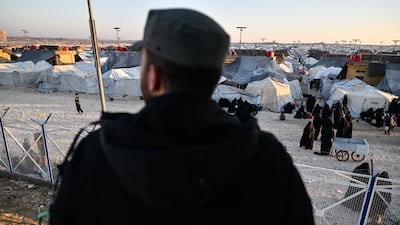US President Donald Trump said yesterday that Iran's supreme leader Ayatollah Ali Khamenei should be "very worried" – perhaps not a great message to put out as negotiators are due to meet for talks this week.
Iran and the US have been trading threats over the past few weeks amid a crackdown by Tehran on widespread protests. Mr Trump has been vocal in his support for the protesters, many of whom have been calling for regime change, and has threatened to strike Iran over the crackdown. Mr Khamenei has warned that a US strike would unleash a regional war.
But as the weeks have passed, the protests have largely ended, after several thousand people were killed and thousands more arrested, and the US has still not struck Iran, despite sending a massive "armada" to the region. One of the ships in that armada this week shot down an Iranian drone that got too close for comfort.
After a lot of back and forth, it seems Iranian and American negotiators will meet in Oman on Friday. US Secretary of State Marco Rubio said yesterday that for any talks to be fruitful they would have to include limiting the range of Iran's ballistic missiles. They would also have to address its "sponsorship of terrorist organisations across the region", its nuclear programme and its treatment of its own people.
With the fate of the world on his shoulders, it's no wonder Mr Trump has been a bit tetchy of late. This week, he lashed out at a reporter in the Oval Office after she asked him about the release of the latest trove of files related to Jeffrey Epstein. The files have been an increasingly heavy millstone around Mr Trump's neck, as his name appears several times in them, along with those of other high-profile figures.
"You are so bad,” he told CNN’s Kaitlan Collins, after scolding her for supposedly never smiling. “You know, you are the worst reporter."
Maybe he's also upset about Bad Bunny doing so well at the Grammys this year. The award-winning Puerto Rican rapper's scheduled appearance at the Super Bowl half-time show this Sunday has stirred a lot of controversy among Trump supporters over the past months. Bad Bunny, whose songs are mostly in Spanish, has been a strong critic of the Trump administration's immigration crackdown and the decision to book him was seen as a thumbing of the nose at the President.
Thankfully, those offended by Bad Bunny and Spanish and immigration now have a choice: conservative political group Turning Point USA is putting on an alternative half-time show that will feature performer Kid Rock, whose recent chart-topping hits include... Well, anyway, he'll be there, and will be joined by Lee Brice and Brantley Gilbert.
Eye on the White House
Trump nominates Kevin Warsh to be next Fed chief

Mr Trump has nominated former US Federal Reserve governor Kevin Warsh to succeed Jerome Powell as the central bank's chairman in May.
The announcement ends months of speculation over who is to lead the central bank after Mr Powell. Mr Trump has repeatedly attacked him for refusing to lower interest rates at the speed and scale his administration wanted.
The nomination for a new Fed chief requires Senate approval. Mr Warsh, 55, became the youngest Fed governor in history when he was nominated in 2006 by the US president at the time, George W Bush. During the global financial crisis, the former Morgan Stanley executive became Fed chairman Ben Bernanke's Wall Street liaison.
Read more from Kyle Fitzgerald
What's Washington talking about?
Hezbollah hearing The Lebanese militant group can still rebuild its military forces, analysts told a US House foreign relations committee hearing this week, warning that the Iran-backed group’s power rests on deep political and financial networks inside Lebanon. The Lebanese military says it has completed the first phase of a disarmament plan for the group, but Washington has expressed frustration about slow progress.
Critical minerals The US said it wants dozens of countries to join a trading bloc for critical minerals to increase members' domestic production and to defend against low-cost supplies from places like China, which produces most of the world's rare-earth minerals. Under the proposal, Vice President JD Vance said members of the “preferential zone” would allow their critical mineral industries to benefit from a price floor that would set a “fair market value” through adjustable tariffs.
WaPo wipeout The renowned Washington Post is experiencing yet another round of layoffs, with deep cuts to every department including its Middle East team. Its sports and books sections will be closed, and the podcast Post Reports will also be cut. The 150-year-old Post, known widely for its coverage of the US capital as well as insight on happenings abroad, is privately owned by billionaire Amazon owner Jeff Bezos.
Spotlight: Raw power rules - why Trump is bolstering US military might

From the Golden Dome missile defence system to a Golden Fleet of warships and a secret weapon dubbed the Discombobulator, Mr Trump has been hyping developments in the Pentagon's arsenal.
In an unpredictable new era where raw power rules and gunboat diplomacy swamps the niceties of international relations, the US leader has blended his salesman's instinct with swaggering boasts about America's military might.
While some of his hyperbole is out of step with reality, his claims highlight transformations in how the US military is acquiring new weapons and expanding capabilities as it focuses more on countering China.
Read more from Thomas Watkins and Jihan Abdalla
Only in America
Could the US soon allow private companies to wage its cyber wars?

Should Mr Trump be able to deputise private US companies to go after cyber criminals around the world?
Global cyber crime, digital scams and hacking are on the rise, so politicians are moving to grant cybersecurity companies the ability to hunt down perpetrators.
A bill introduced in the US Congress last year is seeking to authorise the president to issue “letters of marque and reprisal” to private companies. The proposed legislation, introduced by Republican Representative David Schweikert, takes aim at so-called scam farms.
Letters of marque historically authorise private ships to attack and capture enemy vessels during wartime. The US last used letters of marque in the War of 1812 against Britain.
Read more
The National produces newsletters across an array of subjects. You can sign up here. To receive The Editor's Briefing, our Editor-in-Chief's weekly newsletter that rounds up the top stories, sign up here.


